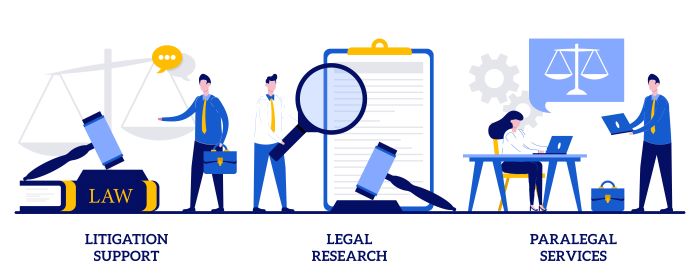Working in the legal field can seem exciting, prestigious or even glamorous. If you’re interested in how civil and criminal cases play out and what really happens in a courtroom, the only thing holding you back from pursuing a career in the legal industry may be the major investment – of money, time and effort – required to complete law school.
Fortunately, there’s another way to be involved in the legal world without putting in the time and costs to become a lawyer. In a much shorter time, you could become a paralegal, a role in which you would serve a valuable role in real civil and criminal legal matters and in which job opportunities are growing at a rapid rate.
RELATED: What Degree Do You Need to Be a Lawyer?
What Are Paralegals and Legal Assistants?
To put it simply, paralegals are professionals working in the legal field who assist lawyers in substantive, rather than purely administrative, ways. Paralegal duties often include compiling facts and documentation in a case into a file, undertaking legal research, preparing legal documents, gathering and handling evidence and assisting attorneys in the courtroom during trials, according to the United States Bureau of Labor Statistics (BLS).

Paralegals commonly work in large law firms, federal government agencies, state governments, local government agencies and finance and insurance firms, according to the Bureau of Labor Statistics.
The Differences Between Paralegals and Lawyers
A paralegal is not a lawyer (who must graduate from law school) or an attorney (who acquires a license to practice law). As such, tasks like providing legal advice and “practicing law” – including representing clients in court, signing certain legal documents like pleadings and taking depositions in which the deponent is answering questions under oath – fall outside of the scope of their work.
RELATED: What Is a Paralegal?
If you want to handle these job duties, you will need to become a lawyer, which means going to law school, passing the Bar Exam and acquiring a license to practice law.
RELATED: Top 25 Law Schools
The Differences Between Paralegals, Legal Assistants and Legal Secretaries
As someone getting ready to embark on a career in law and legal matters, you will soon find out that the terminology you use matters a great deal. You may be wondering what the difference is between three non-lawyer types of legal professionals: paralegals, legal assistants and legal secretaries.
Generally, the work that a legal secretary performs is primarily administrative in nature. These workers are secretaries, or administrative assistants, who work in the legal services industry. Legal secretary roles are distinct from legal assistant and paralegal positions.

The terms ‘legal assistant‘ and ‘paralegal‘ are often used interchangeably to describe jobs that involve performing tasks to support attorneys in more substantive ways. However, an employer may distinguish between these two job roles based on how much of their work is substantive legal work and how much is administrative in nature. Legal assistants may devote more of their time to doing a broader range of administrative tasks, while paralegals may be asked to perform more extensive and more specialized legal work.
Additionally, the term “paralegal” is sometimes used to indicate professionals in this career field who have passed a certification exam and earned professional credentials from national or local paralegal associations.
Preparing for a Paralegal Career
If paralegal sounds like the right career fit for you, the next question is how to get there. Under the American Bar Association (ABA) definition of the occupation, you can become a paralegal through “education, training or work experience.” As such, except in states that directly regulate paralegals – as of 2022, only California – a formal paralegal education program is technically optional. With only a high school diploma, it’s possible to become a paralegal through on-the-job training and work experience.
RELATED: How Does Someone Become a Paralegal?
Should You Go to School in Preparation for a Paralegal Career?
Just because you can become a paralegal without any post-secondary education doesn’t mean that this path is your best option for entering this legal career field. Employers in major law firms are increasingly looking to hire paralegals with more education – often, a bachelor’s degree. Having formal paralegal training or education will expand your job prospects and the value you can bring to law firms or legal departments right off the bat, without the need for extensive supervision and on-the-job training.
Many students who are interested in the paralegal field look for educational programs that are directly intended to prepare them to work in this occupation. Certificate and degree programs that focus on preparing students to become a paralegal often go by names like “paralegal studies.” More than 1,000 formal paralegal education programs are offered at institutions across the United States, although not all of them have earned approval from the American Bar Association.
Levels of Paralegal Education Programs
Programs intended to prepare students for direct entry into the paralegal profession come in many forms. Some paralegal programs award a certificate rather than a full degree, while others culminate in a degree in paralegal studies. The most common levels of study in which a student can pursue formal paralegal education programs are the certificate, associate’s degree and bachelor’s degree levels. However, certain institutions offer advanced paralegal studies at the graduate level, culminating in a graduate certificate or a master’s degree.
Paralegal Certificate Program
A certificate program typically has a narrower focus on the field of paralegal study than you would find in an associate’s or bachelor’s degree program, which includes general education coursework. Programs that award certificates in paralegal training can often be completed in less than a year – sometimes in as little as 14 weeks (about the length of one full semester of college study) or even just six weeks.
However, there’s a catch. Because the curriculum found in paralegal certificate programs typically covers only the legal specialty training required for this career field, the coursework of a paralegal training program that awards only a certificate typically won’t offer students many opportunities to develop their some of the broad paralegal skills needed for success in this career. General communication skills and interpersonal skills are important paralegal skills. To be able to better assist lawyers, it’s also important for aspiring paralegals to practice their research skills in broader contexts – another opportunity you might not have when pursuing paralegal certifications through a program that awards only a certificate.
Certificate programs may require applicants to have already completed some college coursework – often, around 60 credits (the equivalent of an associate’s degree) or 18 months of college-level study.
Associate’s Degree in Paralegal Studies
The quickest way to complete a formal paralegal education program is to enroll in a program at an accredited college that awards an associate degree in paralegal studies. ABA-approved paralegal programs at the associate degree level are commonly offered at community colleges and junior colleges. It typically take two years of full-time study to complete an associate degree program in paralegal or legal studies at an accredited institution.
A paralegal associate’s degree program usually encompasses at least 60 credits of college coursework. The curriculum of an associate degree in paralegal studies program includes both the legal knowledge you would expect to learn in a paralegal certificate program and the general education coursework that can help you develop a comprehensive college-level education in a variety of subjects. By the time they complete associate’s-level paralegal degrees, students are well prepared to pursue paralegal certifications and assist attorneys in a law firm or governmental agency setting.

Bachelor’s Degree in Paralegal Studies
Today, many employers prefer to hire paralegals who possess a more extensive level of college education. Having a bachelor’s degree in paralegal studies, legal studies or even an unrelated field can improve your prospects for landing paralegal jobs.
RELATED: Do I Need a Bachelor’s Degree to Become a Paralegal?
A bachelor’s degree is also referred to as a four-year degree, because most full-time students take at least four years of study to complete the 120 credits typically required for graduation from an accredited school. In a bachelor’s degree in paralegal studies program, you can expect to complete more advanced, extensive and specialized coursework in the concepts, applications and professional practice of paralegal work. You will also complete general education coursework that is designed to make you a well-rounded scholar and citizen and to equip you with strong skills in communication and critical thinking that will be an asset in any career.
If you choose to pursue a bachelor’s degree – whether in paralegal studies, legal studies or another field – you will likely need to enroll in a four-year college or university.
Alternative Majors for Aspiring Paralegals
For a lawyer, a law school degree – the Juris Doctor degree – is non-negotiable. You can’t become a licensed attorney without this educational background. For paralegals, the path into the field is much more flexible. Graduating from a paralegal degree program will undoubtedly help you break into this field, but completing a formal paralegal education program generally isn’t required for becoming a paralegal.
Prospective paralegals may opt to major in another subject, especially one that pertains to their area of legal interest. Others working in the paralegal field stumble into the role from a more general field of study. In fact, the United States Bureau of Labor Statistics (BLS) noted that, despite employers increasingly preferring or requiring a bachelor’s degree, baccalaureate-level degrees in paralegal studies are still only offered at a relatively small number of colleges and universities. As such, paralegals often major in other areas and combine their formal college degree with paralegal certificate or certification programs.
Some of the most popular majors outside of formal paralegal studies and legal studies programs include security and protective service, social science, psychology, history, English and business.
Security and Protective Service Majors
For students who are particularly interested in working in criminal law, a major in the security and protective service fields – namely, criminal justice – is a great choice. This interdisciplinary major typically provides a background in criminal law concepts and procedures and the legal system.
RELATED: What Classes Will I Take in a Criminal Justice Degree?
Although criminal justice majors often go on to pursue careers in law enforcement, corrections, national security or forensic investigations, having this academic background can be valuable for legal work, as well. Some of the courses aspiring paralegals may complete as criminal justice majors include criminal law, criminology, criminal procedure, correctional rehabilitation, crime prevention and specific types of crimes, from white-collar crimes to violent crimes.
Political Science Majors
Disciplines in the social sciences can also provide solid preparation for a paralegal career. Political science is one of the most popular social science majors for paralegals. Politics and policy go hand in hand. Having a background in political science may help prime future paralegals to understand how evolving legislation and case law – legal precedents based on the outcome of prior cases – affect the legal matters they assist with handling in their work. Students of political science may study topics in political theory, comparative politics, American politics and politics in international relations.
Sociology Majors
Sociology is another of the social science majors that can be of interest if you want to become a paralegal. As the study of social relationships, groups and institutions, sociology is relevant to work in the legal services industry because of the social norms that influence laws and behaviors – including criminal or deviant behaviors – and the social institutions involved in the civil and criminal legal systems.
Students of sociology often study the fundamental concepts and theories of the field and the qualitative and quantitative research methods used in sociology, but much of their coursework often consists of electives. A sociology major with an interest in the paralegal profession might fill their schedule with courses pertaining to society and the law, criminology, legal and criminal policies, police and society, deviant behavior and social control, crime in media and specific types of crime, such as juvenile delinquency and violence in intimate relationships.
Psychology Majors
Psychology is the scientific study of thinking and behavior. A background in psychology can be an asset for those looking to become a paralegal in several ways. Understanding why people think the ways they do and why they do the things they do can be helpful in building a criminal case against a defendant if the paralegal works in criminal law and supports the prosecution. This same knowledge may also be helpful when building a civil case, whether on the plaintiff’s side or the defendant’s side, in a variety of areas.
History Majors
Part of working in the legal industry is being able to understand the history of laws and their interpretations as established by case law. Additionally, studying history typically requires a great deal of reading, writing and research, all of which are skills that a paralegal will need to use on a regular basis. While history majors commonly take classes in the history of different geographical or topical areas during different eras, it isn’t the content of the curriculum that can prepare you for the paralegal profession as much as it is the skills you develop through this coursework.
English Majors
Work as a paralegal involves a lot of reading and writing, so English is a solid major choice for students interested in becoming a paralegal. English majors commonly complete major coursework in the study of literature, ranging from historical poems, plays and stories to modern novels and memoirs. Although there are significant differences between literary writing and legal writing, having strong writing and communication skills in general will help you be a better paralegal.
Writing and Communication Majors
Another major that emphasizes skills in reading, writing and research is the communications field. This field is more varied than a student may initially expect, but any of the majors that fall within it can help students cultivate these abilities that are critical for success as a paralegal.
Communications majors may study the communications industry more broadly than English majors. Journalism majors focus on developing the skills used in investigative reporting and in writing news and feature stories for print or digital newspapers and magazines. Creative writing majors are likely to focus more on crafting literary fiction, poetry or creative nonfiction. Writing arts or professional writing majors may develop the skills for writing a variety of content, from corporate communications to investigative deep-dives told in the form of new media.
Business Majors
There’s a lot of overlap between business and the legal industry. From criminal embezzlement and money laundering cases that call for forensic accounting services to working in corporate legal departments, it isn’t difficult to see why having a background in business could be valuable for prospective paralegals.
Generally, business administration and accounting are among the most relevant business majors to consider, but other business fields may also be worth considering. For example, if you want to work in real estate law, you might consider majoring in real estate management or real estate finance. Business subjects aren’t the traditional majors for paralegals, but if you know what path you want to pursue, studying business may be a worthwhile choice for you.
What to Look for in a Paralegal Education Program
If you decide to follow the paralegal degree path to get into the paralegal profession, you have a lot of options. The question is, how do you pick the right paralegal program for you?
First, think about what level of study fits your needs and qualifications. An associate degree may be your best option for a quick start in the field if you don’t want to enter the career with no formal education. A bachelor’s degree will provide you with more extensive legal knowledge and give you more job opportunities. A certificate program can fill the skills gap if you already have some level of college education but you don’t yet have the legal specialty training to work in the paralegal field.
RELATED: Do I Need a Specific Degree or Complete a Course to Become a Paralegal?
Once you decide what level of education you’re looking for you, you can narrow down your school search. Ideally, you should consider a paralegal degree or certificate program that has earned the approval of the American Bar Association (ABA). Choosing an ABA-approved paralegal program ensures that the curriculum you complete meets the high standards set by an outside organization. Employers may prefer candidates who completed their studies in a paralegal program approved by the American Bar Association. Certain states and paralegal associations may recognize degrees from a paralegal program approved by the ABA more readily than from programs that haven’t attained ABA approval.
Are There Online Paralegal Programs?
Distance learning may be an option for some aspiring paralegals, although there are some caveats you should be aware of. Many courses of study marketed as online paralegal education programs are not fully online programs but rather hybrid programs that require some on-campus coursework. Historically, the American Bar Association hasn’t approved fully online paralegal education programs, although institutions like American National University now advertise that they offer some fully online ABA-approved options.
If you are leaning toward online learning, make sure you understand whether your program includes any in-person requirements and whether your program specifically – not just the on-campus versions of the program – is ABA-approved.
Common Coursework in Paralegal Programs
What exactly should students expect to learn in a paralegal program? Legal studies programs intended for paralegals typically cover essential skills in legal research and writing as well as legal theory, legal terminology, skills in the use of legal software and the different stages of the legal process and the principles and procedures used in various areas of legal practice. Additionally, an ABA-approved paralegal program must address the ethical concerns and professional responsibilities of paralegals.
Legal Research and Legal Writing
If there are two job duties that paralegals perform most often, they are conducting legal research and drafting court documents. As a result, a student who wants to become a paralegal must learn the methods of legal research. A certified legal assistant may be expected to utilize a variety of research methods, from interviewing claimants and witnesses to identifying all matters of case law that are relevant to a legal matter.

A lot of work in the legal industry involves writing legal documents, which can range from contracts to filed complaints (lawsuits). Legal writing must be precise and is very different from other forms of writing. Since drafting these documents is an important part of this career, studying the right way to write for the legal industry is an essential part of becoming a paralegal.
Areas of Paralegal Practice
Don’t be surprised if your legal studies curriculum includes classes in specific areas of law, such as criminal law practice and procedure and civil law practice. Students can often use electives to gain a deeper knowledge of different areas of law, such as bankruptcy law practice, procedural law practice, divorce law practice, intellectual property law practice and immigration law practice.
Paralegal Career Requirements Beyond the Degree
Completing a paralegal program is an important step toward becoming a paralegal, but it isn’t the only thing to consider – especially if your goal is to become a certified legal assistant.
Professional Experience Working in the Legal Industry
Having experience working in a law office can only help you in your journey to become a paralegal. Employers value professional experience in a law office, government organizations and other areas involved in the legal industry. Naturally, you will gain this experience once you begin your first job as a paralegal, regardless of whether you are hired to work in a law office, a government agency or a corporate legal department.
However, you don’t have to wait until you graduate to begin acquiring work experience that will be relevant in your future as a paralegal. Many paralegal professionals first gain experience through internships. In fact, a paralegal program is likely to require or at least encourage students to participate in internships to gain firsthand experience working in law firms and similar environments.
A student who wants to become a paralegal should look for internship opportunities that allow them to gain experience in any part of the legal system. This may mean private law firms, government agencies or corporate legal departments.
If possible, consider completing multiple internships in different work environments so that you can decide which type of environment most appeals to you. Small law offices may function differently than large law offices, determining whether your job duties are highly focused on one type of legal matter or stage of litigation or whether you are involved in a variety of tasks. The experience of working for a private law firm that handles criminal defense work can be very different than that of working for law firms that specialize in family law or personal injury law.
Specialized Knowledge of Particular Areas of Law
Many paralegals work in certain areas of law. By specializing in assisting lawyers with certain types of legal matters, these legal professionals can develop a greater depth of knowledge in their areas of focus.
Paralegals work in just about all areas of law, so their options for specialization are numerous. A paralegal might choose to specialize in an area such as contract law, employment law, corporate law, family law or intellectual property law.

Your area of specialty as a paralegal affects the types of cases you work on, your specific job duties and your potential work environments. For example, criminal law paralegals may work in private law firms or government agencies. Wherever these paralegals work, they are likely to spend time gathering and handling evidence and supporting attorneys in the courtroom. On the other hand, corporate paralegals may work in a law firm but are also likely to find employment in a corporate legal department, where they spend much of their time preparing contracts and other legal documents.
Choosing a specialization isn’t necessarily part of becoming a paralegal in the first place. Instead, you may build one or more areas of specialization through the paralegal jobs you work over the course of your career. You may also choose to complete formal training in areas of specialization as part of the continuing education coursework needed to maintain certification from a national paralegal association.
Paralegal Certification from Professional Organizations
For paralegals and legal assistants, professional certification is generally voluntary. However, optional credentials like certification from national paralegal organizations can improve your career opportunities. Many employers prefer to hire a certified paralegal over one with equivalent levels of education and experience but no professional credentials.
Many different organizations and associations offer paralegal certification programs. One well-known paralegal association is the National Association of Legal Assistants (NALA). The National Federation of Paralegal Associations (NFPA) is another easily recognizable paralegal association. Some professionals in this career path choose to pursue both national paralegal certification and credentials from local paralegal organizations and associations and state bar associations, where offered.
The NALA Certified Paralegal (CP) certification. To earn certification from the National Association of Legal Assistants (NALA), you generally need a bachelor’s degree (not necessarily in paralegal studies), seven years of work experience as a paralegal and passing scores on both the Knowledge Exam and Skills Exam sections of the Certified Paralegal Examination. Some Certified Paralegals still refer to themselves with the Certified Legal Assistant, or CLA, credential, although the paralegal association has embraced the term “Certified Paralegal” based on professional preference in the industry. In addition to its CP certification, the National Association for Legal Assistants (NALA) also offers the Advanced Certified Paralegal (ACP) Program. To become an advanced certified paralegal, you need to complete 20 hours of web-based courses and an assessment in your area of specialization.
The NFPA offers two levels of certification. The Paralegal CORE Competency Exam (PCCE) qualifies an early-career paralegal as a Core Registered Paralegal (CRP). The Paralegal Advanced Competency Exam (PACE) qualifies legal assistants with years of experience as Registered Paralegals (RPs).
NALS, the Association for Legal Professionals, offers three levels of paralegal certification: the Professional Paralegal (PP) credential, the Accredited Legal Professional (ALP) credential and the Certified Legal Professional/Professional Legal Secretary (CLP/PLS) credential.
Certifications awarded by any reputable paralegal association – including the National Association for Legal Assistants and the National Federation of Paralegal Associations – can make you a more appealing candidate for paralegal and legal assistant jobs. Generally, becoming a certified paralegal means meeting eligibility requirements that include education and experience, passing a certification exam and maintaining your credential by meeting continuing education requirements.
Related Resources:
Do Different States Have Different Rules About Becoming a Paralegal?
What Does a Lawyer Look for When They Are Hiring a Paralegal?
What Is the Difference Between Paralegal and Legal Assistant?


